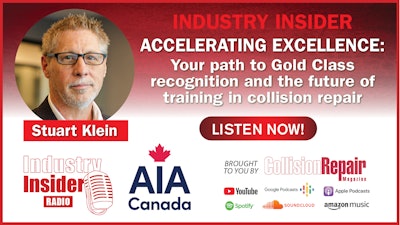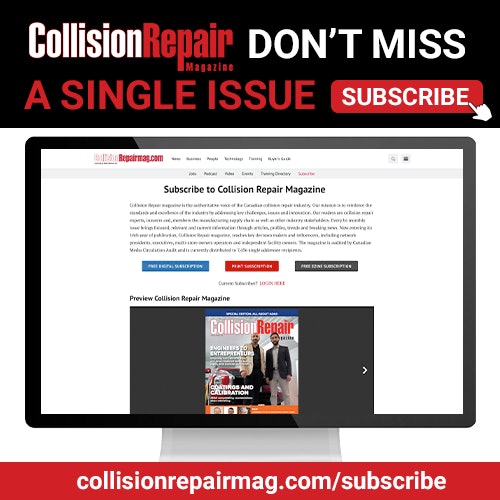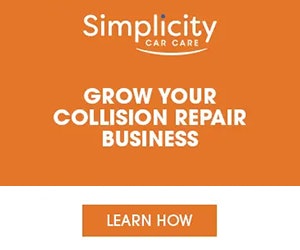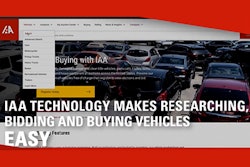
Transcript
In this episode of industry insider Stuart Klein discusses his career path and the critical role of ICAR in enhancing collision repair training in Canada. He explains how ICAR supports ongoing technician education beyond Red Seal certification and offers recognized designations like Platinum and Gold Class. He also highlights partnerships with organizations like the Canadian Welding Bureau to improve training access, especially in remote areas. ICAR’s subscription model helps shops train staff efficiently, and achieving Gold Class reflects a shop’s commitment to quality and staying current with industry changes.
Allison: So welcome, everyone back to the industry Insider podcast from Collision Repair Magazine. We are here today with Stuart Klein. He's the vice President of Collision Rep Programs at AIA Canada and the Executive Director of ICAR Canada.
Thank you so much for being here with us today, Stu. Let's just start with your introduction to the industry. I know lots of people know you, but let's get into how much you've contributed to the industry in recent years and overall your whole career. So, Stu, I'll hand the mic to you.
Stuart Klein: Thanks, Alison. Thanks for having me today. It's a pleasure. I've got a long, fancy title that's kind of hard to spit out. I know that, but I have been in the industry for. I don't even know if I want to say the years. My gosh, 46 years or more. And I started as a technician. As a lot of people know, I did start repairing vehicles. That's where my initial passion comes from. And then I've worked for an insurance company for 10 years, worked for major network for 15 years, where I would audit shop processes and coach for improvement, ran their training facility. But ICAR was always really close to my heart because I started taking ICAR courses way, way, way back and before my hair was gray.
And I started to realize how much I didn't know and how much there was to know and that not everybody in the shop really, really knew everything. And so I became an IAR trainer, like, about 25 years ago. And so that started my affair with ICAR. So then two years ago, I had the opportunity to come in to the Automotive Industries association of Canada, who is a not for profit that has the contract to deliver ICAR in Canada. They've had that contract for over 15 years. So that's probably the shortest version I can give.
Allison: No, I knew you, and you worked for that major network, and you've known each other for a number of years now, and I know how dedicated you are to the industry.
So I'm very excited to have you here on this podcast to discuss the ICAR programs and everything they have to offer to the industry. So let's just get right into it. Stu, can you explain what ICAR is and how it kind of administers or operates the Canadian collision repair industry?
Stuart Klein: Sure. ICAR itself is a not for profit, and it is located in the United States, in the Chicago areas where they had offices. Everything they do relates directly to the Canadian collision market. But ICAR started way back in 1979 as I sort of alluded to that's about two years after I got into the industry to age myself. And they develop training programs sort of, obviously, I guess, for the collision industry. But ICAR themselves don't really sort of decide what to do. ICAR stands for the Inter Industry Conference on Auto Collision Repair, which is again, is a long set of words for that acronym.
But what it means is that there's every segment of the collision industry is involved in the board of governance of ICAR, and they have over 500 volunteers across the industry. That's who decides what goes on at iar. It's the industry at street level that decides what goes on at ICAR. And over the years, it was very reactionary in the early days. And over the years, through these volunteers, they've been able to break out the roles within a shop. And they've developed eight specific training paths that they call the Professional Development Plan, and that lays out the fundamental skills and knowledge requirements in the typical roles within a collision center.
How it relates to Canada, because as I mentioned in the intro, AIA, which is the Automotive Industries Association of Canada, we're not for profit, and we have the contract to deliver ICAR in Canada, and that contract has been for over 15 years. So we deliver all those courses and all the products that ICAR develops in the Canadian market. And I'd say that 99.9 percent of everything developed relates 100 percent to the Canadian market because our culture is pretty similar, the industry is pretty similar. And we're certainly repairing basically the same vehicles across the border.
Allison: Excellent. We have a lot of experience in this industry. So I understand, as you mentioned, there's different levels to the ICAR platform, whether it comes to shops or technicians. Can you educate and give us some more information on the different tiers of things that are available for people?
Stuart Klein: Sure, Allison. I think most of the people listening to the podcast probably know that there's the two main credentialing systems that ICAR has, which is called Platinum and Gold Class. And Platinum is a designation that an individual can reach, and Gold Class is a designation that a shop can reach if they have a certain number of Platinum individuals working for them.
Allison: We'll get into that at the latter end of the podcast. But I'd like to know, Stu, what are some benefits to having a Gold Class certified collision repair center?
Stuart Klein: Well, there's quite a few benefits in my opinion, and certainly you might hear someone say that they're pursuing Gold Class simply so they can get onto an OEM program or an insurance program. However, there's a lot of reasons why those vehicle makers and insurers require Gold Class and they relate to a lot of benefits to the shop. So I'll start to beginning.
There's maybe a bit of a misconception across the country that we have the red seal program for technicians. And the red seal program is good. I'm a red seald technician myself. I'm very proud of it. But we can't rest our laurels on red seal. It has no ongoing training requirements. It is not administered equally across the country. I would say first of all that the certificate of qualification which leads to red seal, they're administered provincially and territorially and there's differences. It's also not mandated in every province or territory. It's simply not required everywhere. So by having Gold class, you are ensuring the fundamental skill and knowledge of each technician and estimator that is working on vehicles.
An especially important where the certificate of qualification or that red seal are not mandated. And the other slight misconception may, or maybe just lack of education is that there is some differences between Platinum rolell and the red seal. I mentioned that you need a certain number of platinum individuals to become Gold class. So there's a bit of a training gap where ICAR Canada recognizes the value of red seal and a red seal technician will get 74 credits towards ICAR many of them which pertain directly to those platinum roles. But there is a gap. There is a gap in training where the red seal doesn't cover a certain number of things, welding certifications and there's other things that are not covered under the red seal program.
So a platinum individual has reached actually a slightly higher level of training than even a red seal. And it's a little bit more up to date because ICAR reviews every course every four years minimum is reviewed. And it may require an update, it may not require an update, it may require to be sunset and replaced. So the Gold class program and the Platinum program require ongoing training from technicians. So they have to keep their skills up to date. The Red Seal program, once you're done it, you're done it.
There's no requirement to update. Like I said, it's not a bad program. But why is Gold class better? These are some of the reasons. ICAR works directly with the OEMs and the industry in general, but really particularly closely with the OEMs. So new information and training gets to market a lot quicker than the apprenticeship and red seal program as well.
So because of that, the Gold Class program and the Platinum program are dynamic. They're somewhat dynamic where they can make changes, you know, at any time. They could change it based on the needs of the industry, based on the information from their volunteers and so on. So there are some of the reasons why a lot of OEMs and insurers ask shops to be Gold Class. It's a little bit higher standard than Red Seal. It's a solid foundation for them to go towards an OEM program. The OEM specific training is going to be required after Gold Class.
That's more specific, higher level of training. So rather than becoming Gold Class to appease an OER insurance program, to me it really shows the entire industry that you're serious about training and keeping up to date. And in a time when a lot of people are still talking about wanting industry standardization, which the Canadian industry hasn't figured out yet currently, this is really the only thing. Gold Class is really the only thing we have that is truly standardized, built by the industry. I cars agnostic, you know, non denominational and so on. So Gold Class really gives you the standardized foundation.
Allison: Yeah, I really like the point you made there about the fact that people think that it's just for OEM accreditation. It, it's not just, you know, to make those OEM credentials. It's truly, it provides them really great training. And I like the point that you mentioned too about the welding requirement. That's not there with red steel. So I know you, um, with AIA, the Automotive Industry association, you guys have an affiliation with the Canadian Welding Bureau. So you have a program that you've coordinated with them. Can you explain more to the audience about that?
Stuart Klein: Sure. The Canadian Welding Bureau, call them CWB for short. They're part of our industry Training alliance and that is part of our sustaining partner program.
So ICAR recognizes that we're not the only people that know how to train. We're certainly not the only people with the knowledge to train, you know. But what ICAR is, is a good, like I said, sort of non denominational agnostic standardizer. We get the, we set the standard based on the industry input.
And so our training alliance, what that does is it allows a partner that has training specific maybe to their product or specific to the industry to have their training reviewed by ICAR and they look at it for those skills and knowledge that I said that ICAR sets out the skill and knowledge requirements so that they will review training programs against that skills and knowledge requirement. And if it meets that, then a certain company, in this case Canadian Welding Bureau can have a training program that they have developed accredited, which means that somebody could take their training and they would get a ICAR credit and not have to take redundant training.
That's something that really annoys the industry legitimately is they take a training course, spend money, spend time and then find out that they have to take an ICAR course, which is basically the same thing. Well that's super annoying for the industry. So the training alliance helps prevent that. So with the Canadian Welding Bureau in particular, we have a lot of partners and anybody could go onto to the ICAR Canada site and on the left there's a tab that says Training Alliance, Industry Training Alliance. And they can see all of the courses in there and all the credits they could get and they all come on to one transcript. So it's good for a technician.
But CWB in particular have two programs. They have an automotive steel welding program and an automotive aluminum welding program. Those two programs in particular have been reviewed by ICAR and deemed equivalent to. So somebody can take that CWB course, get an ICAR credit, not have to take redundant training. So what that helps us with from an ICAR Canada perspective is that we're looking for solutions to welding.
You know you require welding certification for Gold Class and we have some definitely have some underserviced areas and some remote areas and so on. CWB has very good remote trainers. That's going to really help us in some of these remote underserviced areas. They also might be dealing with some certain groups and it really helps us expand our ability to deliver welding training and certification across the country.
Allison: Excellent. The training link that SU has talked about, we will link that down below in the description if you guys want to go look at it. And I'll follow on to my next question now Stu, for shops that are listening, that might be at ground zero, what does becoming an IC Gold Class certified entail? What are some of the requirements they may need? They might think it's a big mission, but it's for your ultimate service like requirements. So what would they need to be able to meet that?
Stuart Klein: Well you know, you're right. If they were starting at ground zero, it is a big task for sure. If you actually have no red seal technicians and you've had zero training, this would be a journey for sure. This would be a three year journey or maybe more.
And you know this obviously just a cost involved but what it requires to become um, Gold is what it requires, as I sort of alluded to earlier, is it requires platinum, um, individuals within the shop. There's about eight different roles that ICAR has developed.
But the four main roles that you require in a shop are a structural technician, a non structural technician, a refinisher, an estimator. And so to become gold class, you require those roles to be platinum. Somebody in those rules to be platinum within your shop. There's some other rules. I mean it depends on how many people you have in your shop. You need a certain number of structural technicians need to be platinum. And you know, that's actually something I didn't mention in the benefits of being gold class.
The benefit to why insurers demand it and is because it covers an estimator s role as well. You know, the estimator role isn't really covered in red seal and it's a big role of training. The only standardized training path I know of for a shop to go down a gold class. First of all, if you do have red seal technicians get their trade license over to ICAR Canada at Info Atash Car ca send a copy of that and then they will automatically get 74 credits. You know, and many of those credits are in those rules.
That will help take a bit of the burden off. The other thing is that training alliances, if you go through that training alliance on our website, a shop could say, oh my gosh, we've taken this and this and this already. We've got a credit for this already. That way you can eliminate some of the redundant training. But I can tell you it's a journey. If you're starting really at zero, for sure it's a journey. We've also introduced a subscription program in Canada.
And that subscription program is actually the thought behind it really was to help a shop get to gole class. Because a shop that goes on subscription without really getting into the details of subscription, it's like it sounds, you pay a certain price and then you're. And then. And you've got unlimited access to online training for the year. So that could be a really, really big benefit for someone working towards gold class. You can train the heck out of the people and you pay one price. It's like all you can eat buffet, so to speak.
Allison: Yeah, exactly. That's a great reference to put it too. But yeah, 74 credits. If you're a red seal already, like Steve said, you don't have to repeat those courses and learn stuff that you've already learned. So we'll put that link down below the one that Stu mentioned.
And just, just to close things off here, Stu, I know I've seen online some of the benefits just from people that we work with all the time, like Dana from Dana Alexander from CSN, Dana'Londonderry they gave us some information too. And Chelsea from PAR Auto Body and all of her collaborators. There's been a lot of information about how Gold classes really benefited them. And one of them was discussed before. People always understand that it's OEM benefits
00:15:00
Allison: of course, but being OEM certified is a really big thing nowadays. Like you really should be OEM certified whenever these OEMs are demanding things with you. But overall it's the customers, they really want quality. They want quality repairs, they want another cars being repaired correctly and having that little gold seal on the front of their shop and being able to tell customers all where ICAR Gold seal certified. When you guys are the ultimate providers of the correct collision repairs in Canada, how has this really benefited their business?
Stuart Klein: Well, you're given some good examples there of shops that I would consider leaders in the industry. You know, are these are folks that have taken it on themselves. Some of them. Certainly there may be a mandate that they have to follow.
But those shops that you mentioned, along with others, we've got about 700 gold class shops presently in the Canadian market. And these are industry leaders that typically when you talk to them, they're saying that they see the value in keeping abreast with what ICAR likes to call the technical tsunami.
That's a IAR is a trademarked, trademarked wordsmithing and it's kind of good wordsmithing because this non stop barrage of changes and technical updating with vehicles, you know, how are you keeping up with it? IAR Gold Class demands that you keep up with it. So all those reasons that I've already mentioned are things that these shops talk about. And I know that Dana, I know he mentioned about technicians and estimators and repair planners. We have training path for production managers and for ADAs. So once you get past the actual requirements for Gold class, there is just a ton of training in there to keep your staff up to date.
There's just more and more and more and more. And the more you learn, the more you realize, typically anyways, the more you learn, the more you realize how little you know. And as soon as you think you know something, at least me personally, my experience has been as soon as I think I know something, something happens that Reminds me how little I actually know. Anyway, I'd say that's sort of an overview of what I hear from those leaders in the industry that are doing it for the benefits we've already talked about. They're not doing it just so they can meet a mandate.
Allison: Yeah, I'm sure we've all heard of Parr and Tom Bissonnette and Chelsea and all of her different partners there. They are all doing an incredible job. And of course Dana and his daughter Shelley, they do an incredible job over there. And Londonerry also is a leader. So it's important to listen to what these leaders, as Ste said, are talking about and hear what they have to say about this program. I think you guys are doing an incredible job. Stu, you've done an incredible job with the program. Is there any last words you'd like to give to the industry?
Stuart Klein: Well, thank you for the kind words. Maybe the last thing I just say is for a shop to maybe look into the benefits of subscription. That's certainly not for every shop. It's not a one size fits all. You pay per person that's required to train. You get unlimited access. You know you get a 10% discount on welding programs. So there's some value there. But the shops that are using that presently, they're getting really good value because they're doing more training at a little lower cost per unit is what happens for people that really interested in training. And like I said, There's ADAS courses and there's production manager. There's OE specific courses, EV courses. There's one over 170 online courses. It's so much more than just gold class. You know.
Another benefit is that is people come and go out of your shop. You're not paying extra, you've paid for subscription. Somebody comes in your shop, you just update your shop roster with ICAR and they start training. So there's a lot of benefits that way. The other thing too is updates to the program. You know, like I mentioned, every program is reviewed minimum every four years at Iear and they may do us. Sometimes they do a very small update. This M might only be one or two slides. Technicians might retake the course and they kind of, they might complain a bit, quite honestly because they're taking the whole course again for one slide. Well, if you're on subscription, it's no additional cost.
Yes, you do have to spend 30 minutes and take the course and just to see what the update was because it's new information. There's no extra cost. And the other thing too, like I said that these programs are very dynamic and they respond to the market needs like the platinum Rolel that is not chiselled in stone and it will change from time to time.
In fact, In 2026 in Canada, the platinum rolls will receive a bit of an update where there's going to be some requirement for some fundamental adas training under each of those platinum rolls. So just watch for that. And if you're on subscription again, those courses are no extra charge. You just have to find the time to take them. That's my little plug for subscription. I think it's a really good product that will really help some shop. I can tell you the shops that are around it now are loving it.
Allison: O absolutely. Thank you Stu. That sounds like a great program. I personally look at some ICAR courses myself. They are fantastic. So I really appreciate that and I really appreciate having you on here. It's given me a lot of knowledge as well as I'm sure our audience has gained a lot of knowledge. So as we mentioned, we'll put the links down below and just thank you again Stu for being on the podcast here today.
Stuart Klein: Thanks for having me, Allison. It's always a pleasure talking, always.
Allison: Yeah. Well, thank you guys so much.
00:20:00
Allison: We will be available, wherever your podcasts are. Apple Podcast, Spotify, soundcloud, Yahoo Music, all of the places where you can get your podcast. So just feel free to download us and subscribe so you can catch our next podcast and we'll be back next time. Thank you guys so much.
00:20:14
























